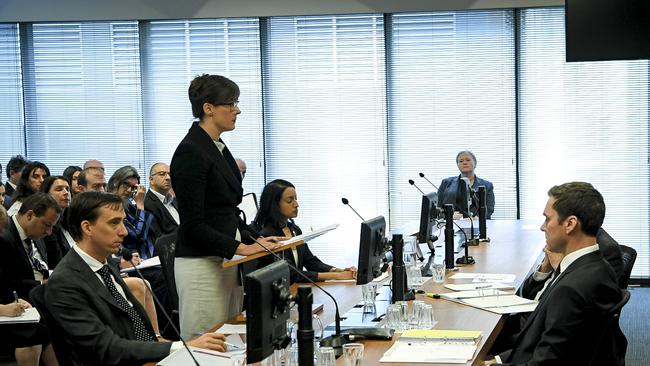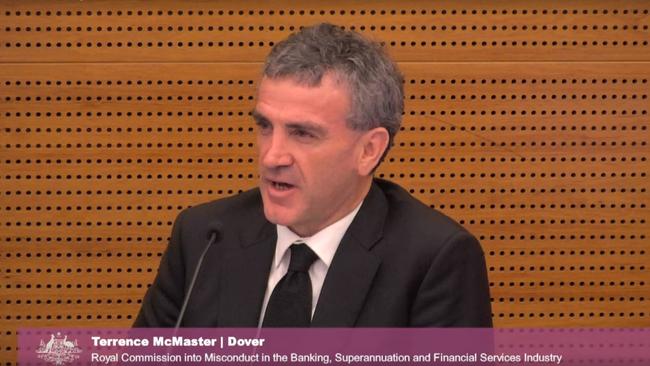Banking royal commission: ‘AMP committed crimes by deliberately misleading ASIC’
AMP’s share price has tapped a six-year low after the bank inquiry hears it committed crimes by misleading ASIC.

AMP committed criminal offences by misleading ASIC, counsel assisting the royal commission, Rowena Orr, has told commissioner Kenneth Hayne.
She said it was open to Mr Hayne to find that in four of the 20 times AMP misled ASIC over a fee-for-no-service scandal it breached two sections of the Corporations Act that carry criminal penalties.
Shares in AMP (AMP) dipped to a six-year low of $4.01 following the comments.
The two sections are section 1308 (4) and 1308 (5) of the Corporations Act.
Section 1308(4) says that anyone who makes a submission to ASIC that is false or misleading without taking “reasonable steps to ensure that the statement was not false or misleading in a material particular or to ensure that the document did not omit any matter or thing without which the document would be misleading in a material respect, as the case may be, is guilty of an offence”.
Section 1308(5) makes anyone who authorises such a submission also responsible.
“AMPs conduct in regards to misleading ASIC fell below community expectations,” Ms Orr said. “AMP adopted an attitude towards the regulator that was not forthright or honest and demonstrated an attempt to mislead,” she said. Ms Orr said it was “attributable to the governance and cultural practices at AMP”.
Ms Orr said the commission was open to find AMP chairman Catherine Brenner, chief executive Craig Meller and “particularly” chief counsel Brian Salter, “either marked up or suggested amendments to the Clayton Utz report”.
She said AMP did not make any reference to this conduct in its submission to the royal commission.
Ms Orr said the behaviour relating to the Clayton Utz report was due to poor culture and governance controls within AMP. She said there was an “absence” of compliance culture at a persistent and senior level within AMP that made it seem acceptable to executives to deal with ASIC in a dishonest manner.
Ms Orr said executives had been warned by junior staff about there being two company policies to charge clients fees for no service and that these may be a legal breach but executives ignored this.
It was also open to find AMP committed crimes by deliberately misleading ASIC about the “independence” of a report into the debacle by law firm Clayton Utz.
AMP received 25 drafts of the report and there was extensive correspondence between AMP executives and the firm about what should be included in it.
This could breach two sections of the Corporations Act dealing with telling lies to ASIC and a section of the ASIC Act about providing false information to the regulator.
Three AMP Advisers
Three AMP advisers may have engaged in misconduct and may have breached financial advice laws, the royal commission has heard
During questioning this week, Ms Orr, took AMP’s head of advice compliance, Sarah Britt, to three planners whose clients have yet to be told of their financial losses: Adam Palmer, Jennifer Coleman and a man codenamed “Mr E”.

On Friday, Ms Orr said Mr E may have engaged in misconduct. “AMP conceded this in its submissions and evidence,” Ms Orr said. In particular, she said, Mr E may have breached laws requiring he act in the best interests of customers and give them appropriate advice.
Ms Orr said Ms Coleman may also have engaged in misconduct by providing advice that was not appropriate or in the best interests of customers. “Again, AMP conceded this in its submissions and evidence,” she said.
Mr Palmer, by funnelling customers into investments in which he held shares, also may have engaged in misconduct, Ms Orr said.
The commission heard that Mr Palmer came to AMP’s Genesys business, which has since been shut down, in 2013. He previously worked for Australian Financial Services, which the commission previously heard had been a troubled operation that was in the process of shutting down at the time — provoking a feeding frenzy in the industry as players attempted to snap up ¬lucrative client books bulging with soon-to-be-banned trailing commissions.
Ms Coleman, who specialised in insurance, became an authorised representative of one of AMP’s planning arms, Charter, in October 2009.
The commission heard she repeatedly told clients that new insurance she recommended would be cheaper than their current cover when in fact it was more expensive.
The commission heard that Mr E had a penchant for rolling his victims into the group’s superannuation products, sometimes costing them thousands in exit fees from the funds they were leaving.
AMP licensee Charter failed to ensure that its audit standards were such that Ms Coleman’s conduct could be detected and remediated at the earliest opportunity. Ms Orr said this could be a breach of the Corporations Act, while AMP’s licensee Genesys may have failed to ensure Mr Palmer complied with financial services laws.
Genesys may also have breached the law by failing to properly assess the appropriateness of financial advisers before hiring them, and then monitoring them.
Ms Orr said the evidence showed Genesys had “a culture of emphasising the growth of the business over ensuring that advisers were appropriately qualified”.
Ms Orr said AMP had found no record that Mr Palmer had completed either an external or in-house self-managed super fund accreditation.
“Mr Palmer had disclosed that he did not hold the relevant qualifications for the services he was to carry out,” Ms Orr said.
“Mr Palmer did not provide any specialist qualifications. He did not list any financial planning industry qualifications on the application form either.”
“AMP and its licensees have failed to remediate the clients of any of those advisers.”
Investment Platform Fees
In relation to the commission’s investigation into investment platform fees, Ms Orr said AMP may have breached statutory obligations to provide honest and efficient services. She said AMP and its subsidiaries failed to act in an efficient manner to get customers out of underperforming platforms.
“There are AMP clients who remain invested in those platforms and AMP knows this,” Ms Orr said. However, she said, the AMP subsidiary who operates those platforms had taken no steps to make those platforms cost competitive or improve those platforms.
Ms Orr said it AMP may also have contravened the Corporations Act requirement to manage conflicts of interest when it was recommending AMP platforms.
She said the conduct of AMP, the two licensees, is also below the standards expected by the community. AMP subsidiary, NMMT, has no technological systems to ensure fees are only charged where it is lawfully appropriate, Ms Orr said.
At 3.45pm (AEST) AMP shares were down 2 cents, or 0.49 per cent, to 4.03, after falling as much as 1 per cent to a six-year low of $4.01.
Sam Henderson
Celebrity financial adviser Sam Henderson committed a crime by giving false information to would-be investors, counsel assisting the banking royal commission, Rowena Orr, has told commissioner Kenneth Hayne.
Ms Orr said it was open to Mr Hayne to find Mr Henderson breached a section 952E of the Corporations Act, which makes giving clients a defective disclosure document an offence.
The commission has heard evidence a financial services guide produced by Mr Henderson’s company, Henderson Maxwell, failed to disclose his interest in a company that administered the funds into which it tipped 84 per cent of customers.

It also said he had a Masters of Commerce when he did not.
Ms Orr said Mr Henderson may also have breached his obligation to act in the best interest of Fair Work Commissioner Donna McKenna, who he tried to sell into a self-managed super fund that would have lost her half a million dollars instantly.
“If Ms McKenna had implemented Mr Henderson’s advice, Henderson Maxwell stood to earn a significant amount in ongoing investment management fees,” Ms Orr said.
The company may also have engaged in misconduct, Ms Orr said.
“Henderson Maxwell is responsible for the conduct of its employees, and an employee impersonated Ms McKenna in telephone calls with Ms MecKenna’s superannuation funds on at least five occasions,” she said.
Dover Financial
Dover Financial — the so-called financial advice licensee of last resort — might have broken the law by creating an “unfair contract” that clients were required to sign up to, Ms Orr told the royal commission.
Dover Financial, one of Australia’s largest advice houses, tried to protect itself from as many customer claims as possible by using an “Orwellian” “client protection policy”, its boss told the royal commission shortly before collapsing in the stand yesterday.
Proceedings at the commission came to an abrupt end just before 4pm yesterday when Dover chief Terry McMaster, who was under questioning by counsel assisting the commission Mark Costello, began breathing heavily before collapsing.

The “client protection policy” was in force until late last month when the Australian Securities & Investments Commission, which has been conducting a lengthy and wideranging investigation into Dover, demanded it be withdrawn.
Under the policy, clients agreed that Dover was not responsible if a financial adviser failed to do a long list of things, including consider their circumstances and undertake adequate research about a product.
Ms Orr said it was open to find that Dover’s practices fell below the standards and expectations of the community.
“It’s recruitment practices … failed to make adequate inquiries before authorising representatives,” she said.
The royal commission heard evidence Dover was authorising representatives who were under investigation by the corporate regulator.
Commonwealth Bank
Ms Orr said it was open to the commission to find Commonwealth Bank’s Financial Planning’s charging of customers fees for no service was “attributable to the remuneration practices” of the group.
Commonwealth Financial Planning Limited remuneration targets were not aligned to ensure delivery of service, Ms Orr said. She said the commission was open to find there was a “cultural tolerance” where CBA was prioritising itself to the “detriment of clients”, which was highlighted by the company’s lax response to the Future of Financial Advice reforms, particularly the grandfathered trailing commissions.
“CFPL has given no consideration to dialling down those commission arrangements to zero,” Ms Orr said.
“In recent years CFPL acted to lessen rather than increase, the prospect of clients receiving meaningful services. The number of financial planners fell by approximately 25 per cent, but the number of clients increased by almost 100 per cent,” she said.
Ms Orr said CFPL only pledged advice customers an “offer” of an annual review, rather than an actual annual review.
She said it was an approach to clients that maximised revenue streams rather than one that relies upon meaningful service.
Ms Orr said Commonwealth Bank’s Colonial business raised further problems about “the appropriateness of platforms” within vertically integrated institutions. She said Colonial may have breached the Corporations Act which requires companies to manage conflicts of interest.
“Colonial preferred its own interest and those of its related entities … to the interests of those invested in its products,” Ms Orr said.
She said Colonial relied on its dealer groups to enforce those laws, but that those laws were not enforced.
Ms Orr said the evidence in the commission raised questions as to whether vertical integration of wealth planners and advice licensees served the interests of clients.
ANZ
The royal commission has also been invited to find ANZ Banking Group’s financial planning firms Millenium3 and RI Advice Group may have breached the law, and that three of its financial advisers may have breached corporations law.
Counsel assisting the royal commission Rowena Orr said ANZ’s licensees may have breached the corporations act to give clients a statement of advice and to ensure appropriate conduct of its staff.
ANZ financial planner Christopher Harris advised one of his clients that rolling over her superannuation into a new account could save $238 a year. But he charged $7,000 for the advice
Mr Harris may have also breached the law to act in the best interests of clients, Ms Orr said.
Millenium3’s conduct may also have engaged in misconduct, failing to obey statutory obligations to ensure honest financial services and ensure its workers complied with the laws, Ms Orr said.
She said Millenium3 allowed Mr Harris to continue to work despite finding he had not been complying with financial services laws.
A Millenium3 adviser, known as Mr A, may have also engaged in misconduct, Ms Orr said. “ANZ conceded so much in its submissions and evidence,” she said, noting Mr A may have breached the law to act in the best interests of clients and not to engage in dishonest conduct
ANZ had offered one planner, John Doyle, up to $150,000 to come across from Australian Financial Services — which was being shut down after the corporate regulator imposed new licence conditions on it — to ANZ subsidiary RI Advice, in March 2013.
Mr Doyle turned out to be a terrible adviser, earning the lowest possible fail mark on an internal audit even though he was allowed to choose the files reviewed, contrary to ANZ policy
RI Advice Group, who authorised Mr Doyle, may have breached statutory obligations under the Corporations Act to ensure its services were efficient, fair and honest and to take steps to ensure its workers complied with financial services laws.
“RI recruited Mr Doyle from a licensee that had been the subject of regulatory action by ASIC. RI Allowed Mr Doyle to provide advice in circumstances where he had failed a competency test at the start of his time with RI advice,” Ms Orr said.
NAB
National Australia Bank’s culture allowed an environment where advisers openly flaunted the law, the royal commission has heard.
This week the commission heard that more than 200 NAB financial advisers falsely claimed to have witnessed forms in which customers set out who they wanted to receive their superannuation when they died.
NAB has identified 2,520 customers whose forms were falsely witnessed, potentially putting at risk their choice of who should get the death benefit.
The bank first discovered the issue in November 2016, when a routine audit of financial adviser Bradley Meyn discovered that he got a customer service officer to falsely witness death benefit nominations signed by a husband and wife.
Mr Meyn was sacked the following month, and the bank began a wider investigation into the issue.

On Friday, counsel assisting the commissioner Rowena Orr said it was open to the commissioner to find that Mr Meyn’s conduct in connection with the advice may have been breaches of financial service slaws, misleading and deceptive.
NAB’s incorrect witnessing of beneficiary nomination forms might have amounted to misconduct. “NAB acknowledged so much in its submissions and evidence,” Ms Orr said.
It’s open to find that NAB breached the Corporation Act with requires companies to act honestly and ensure workers comply with the law.
Ms Orr said the problem was attributable to the culture within the organisation.
“The practice of incorrectly witness such forms was widespread in NAB’s financial advice business,” she said. Advisers “believed it was common practice,” Ms Orr said.
“That so many employees would be willing to sign a formal document attesting to a particular fact that they had witness a customer’s signature when the fact was not true indicates a lack of understand of an respect for ethical and legal obligations within NAB’s financial business,” she said.












To join the conversation, please log in. Don't have an account? Register
Join the conversation, you are commenting as Logout